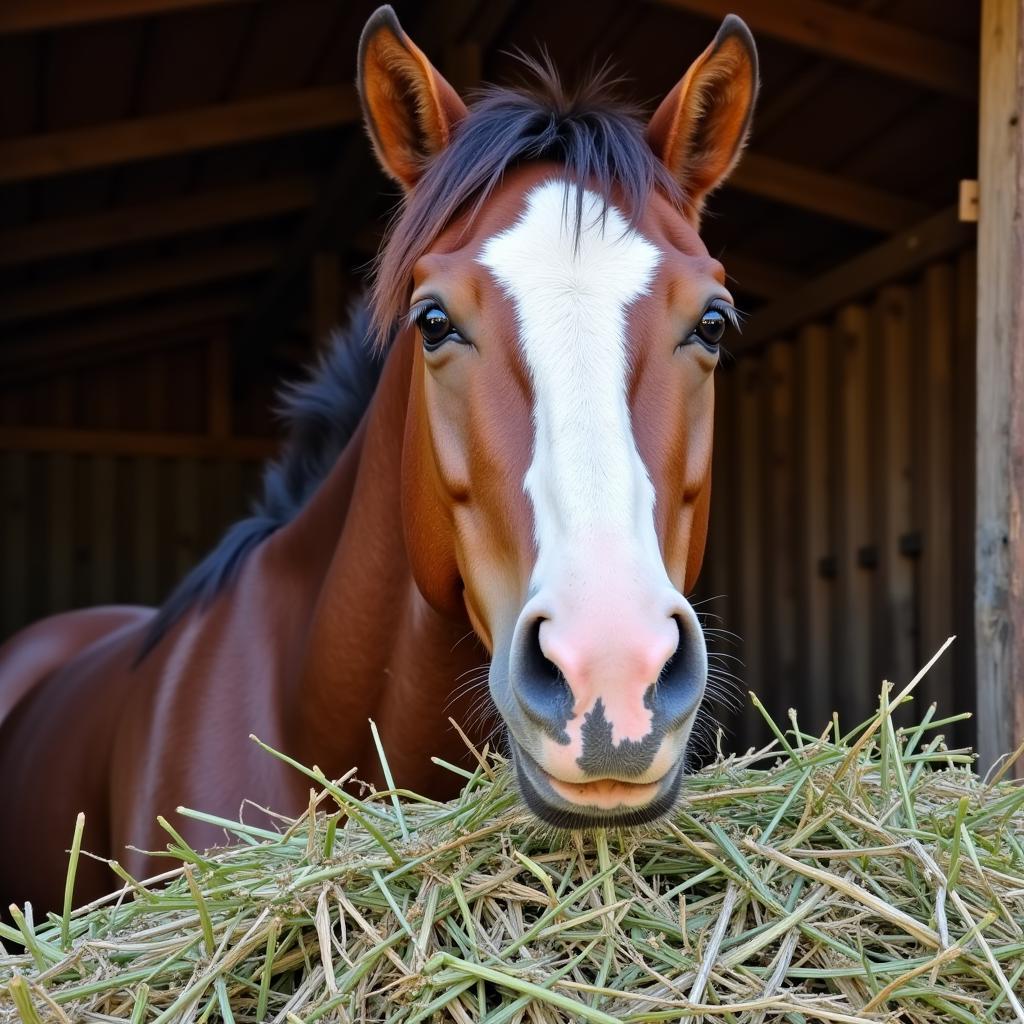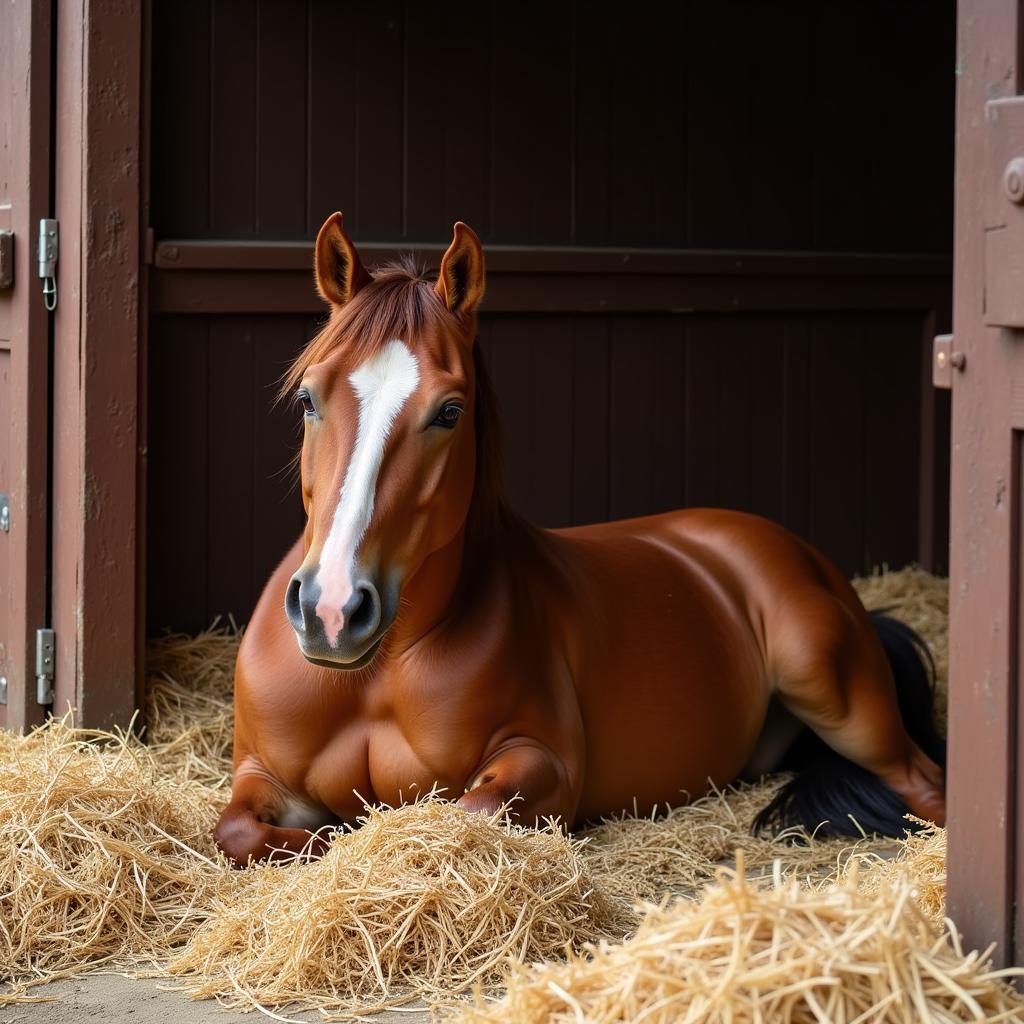Horses are known for their love of hay, but what about straw? It’s a common sight in stables, but can horses actually eat it and should they? Let’s explore the ins and outs of straw in a horse’s diet.
The Difference Between Hay and Straw
While both hay and straw come from the same plants, they serve very different purposes. Hay is harvested when the plant is at its nutritional peak, cut, and dried to preserve its nutrients. This makes it an excellent source of fiber and essential nutrients for horses.
Straw, on the other hand, is harvested after the plant has gone to seed. The stalks are dried and used primarily for bedding due to their absorbent nature. Straw has significantly less nutritional value compared to hay.
So, Will Horses Eat Straw?
The answer is yes, horses may nibble on straw, especially if their hay intake is low or they are bored. However, straw should never be considered a primary food source for horses.
 Horse Eating Hay
Horse Eating Hay
The Risks of Feeding Straw to Horses
While a little nibble here and there might not cause harm, there are several risks associated with feeding straw to horses:
- Nutritional Deficiency: Straw lacks the essential nutrients that horses need to thrive, including protein, vitamins, and minerals. Relying on straw as a primary food source can lead to weight loss, poor coat condition, and other health issues.
- Impaction Colic: Straw is very high in fiber, but it’s a less digestible form compared to hay. This can increase the risk of impaction colic, a potentially life-threatening condition.
- Dental Wear: Straw is much tougher than hay, and chewing on it excessively can lead to premature wear and tear on a horse’s teeth.
“Feeding straw as a primary food source is like offering your horse empty calories,” says Dr. Emily Carter, a veterinarian specializing in equine nutrition. “It fills them up without providing the essential nutrients they need for good health.”
When Straw Can Be Useful
While straw isn’t ideal for feeding, it can still be a valuable resource around the stable:
- Bedding: Straw’s absorbent properties make it excellent bedding material, providing a comfortable and dry resting place for horses.
- Enrichment: Soaking straw in water before feeding can make it more palatable and provide a source of enrichment for horses, especially those prone to boredom. However, this should be done in moderation and with veterinary guidance.
- Adding Bulk to Rations: In some cases, adding small amounts of straw to a horse’s diet might be recommended to add bulk and slow down consumption, especially for horses prone to overeating. However, this should always be done under the guidance of a veterinarian or equine nutritionist.
 Horse Resting in Straw Bedding
Horse Resting in Straw Bedding
Ensuring Your Horse’s Nutritional Needs
Instead of relying on straw, prioritize providing your horse with a balanced diet that includes:
- High-Quality Hay: This should make up the majority of your horse’s diet, offering essential fiber, vitamins, and minerals.
- Grazing: If available, pasture grazing can supplement your horse’s nutritional intake and provide mental stimulation.
- Concentrates: Commercial grain mixes or pelleted feeds can help meet your horse’s energy and nutrient requirements, especially if they are very active or have specific dietary needs.
Conclusion
While horses might nibble on straw, it’s crucial to remember that it shouldn’t be a significant part of their diet. Instead, focus on providing high-quality hay, pasture access (if possible), and balanced concentrates to ensure your horse receives the nutrition they need to thrive. If you have any concerns about your horse’s diet or feeding habits, consult with your veterinarian or an equine nutritionist for personalized guidance.
FAQs
1. Can I use straw as a treat for my horse?
While a small handful of straw occasionally won’t harm your horse, it’s best to opt for healthier treats like carrots, apples (without seeds), or commercially prepared horse treats.
2. My horse seems to prefer eating straw over hay. What should I do?
This could indicate a problem with the quality or palatability of the hay you’re providing. Try offering a different type of hay or consult with your veterinarian to rule out any underlying dental or digestive issues.
3. Can I mix straw and hay together for my horse?
While it might be tempting to mix straw and hay, it’s not recommended. Horses might pick out the tastier hay and leave the less palatable straw, leading to an unbalanced diet.
4. I’m on a tight budget. Are there any cost-effective alternatives to hay?
Talk to your veterinarian about alternative forage sources, such as hay cubes, hay pellets, or chopped forage. They can advise you on the best options for your horse’s needs and budget.
5. My horse ate a large amount of straw. What should I do?
Contact your veterinarian immediately. They can assess the situation and advise on the best course of action.
For more information on horse care and nutrition, check out these articles:
Need help with your horse’s dietary needs? Contact us at Phone Number: 0772127271, Email: [email protected] Or visit our address: QGM2+WX2, Vị Trung, Vị Thuỷ, Hậu Giang, Việt Nam. Our dedicated customer support team is available 24/7 to assist you.